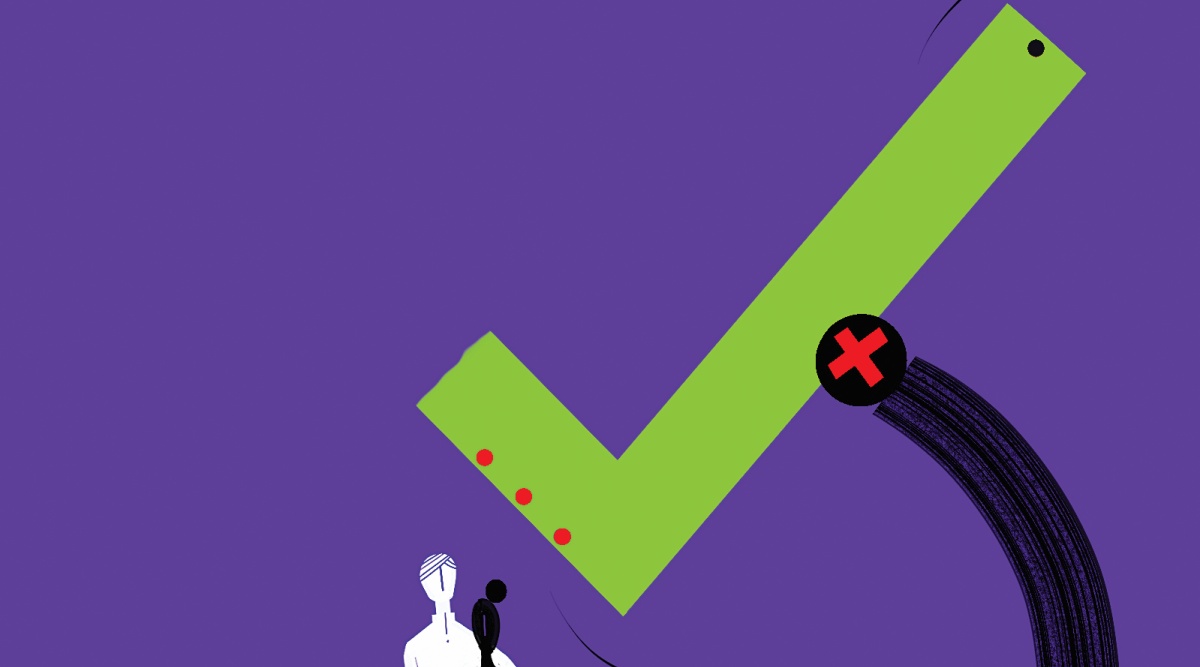By labelling his case as one of ‘wayward’ sons and ‘bad’ celebrity parents, the middle class allows a deliberate distortion of its moral priorities, and puts at risk spaces and individual freedoms gained in the past
One watched the spectacle of Aryan Khan’s car being mobbed by the media and the young man receiving a hero’s welcome from Shah Rukh Khan fans on his release on bail with a surreal feeling. The sensationalism around the case was expected — as was the tragic reality that people pay a price, a heavy one at that, if they are in the public eye. It has also raised some important questions about public morality and individual choice, about where and how to draw the line, and by whom.
Several social media sites and news channels have used Aryan Khan’s arrest under the NDPS Act to dissect the issue of good and bad parenting. The focus on celebrities has ramifications for ordinary folk, too. The questions that have been raised are: Are celebrities (and the rich) in general neglectful of their parental responsibilities? Do they draw a line between what is permissible or not? Do they enforce rules and norms of behaviour? The middle class has steered this discussion and pronounced its judgement in multiple ways that nevertheless converge on the issue of privilege and public morality.
What is public morality? Even though there is no written document that provides a blueprint for what goes under that head, there is a general understanding that individuals are expected to behave in certain ways that are considered acceptable, and that some of these actions are governable by law. In other words, individuals, notwithstanding their private choices and actions, could face legal repercussions for actions that fly in the face of public morality. That then leads us to the questions: How do we come to an agreement about what is acceptable? Is public morality a static concept, something that is a given and immutable?
Those who had gone through their youth and early adulthood in pre-liberalisation India would remember that it was considered improper for middle-class girls and boys to be speaking to each other outside the familial circle, even for innocuous things. If at all it was allowed, there was supposed to be strict supervision so that the youngsters would not cross any “lakshman rekhas”. In the 21st century, it would be ridiculous to tell young women and men in India or elsewhere that they cannot talk to their classmates of the opposite sex, or their neighbours, or the children of family friends.
In cinema, “vamps” such as Jaya Malini, Silk Smitha, and Helen, who had a provocative physical presence, were definitely not meant to be role models. For that, you had docile heroines, who danced, sang and devoted themselves to just one man. Today, neither in terms of attire, nor behaviour, can one distinguish between the “vamp” and the heroine, at least in the mainstream Hindi cinema which is consumed across the country. Young and older women do not feel the need to hide their preference for a particular kind of attire, even if it is considered inappropriate. A man is not the purpose of her existence, and women have made strides in professions of their choice, busting this particular myth. The idea of choosing to live with another outside the bonds of matrimony, while not openly acknowledged, is quite commonplace today. More importantly, to not see marriage as the ultimate destination, especially for women, has gained some semblance of acceptability. There has been a questioning of the law on issues of obscenity, consent in marriage, and rape, even within the institution of marriage, primarily because of the challenges to the established moral conventions of the day.
Drinking and smoking were frowned upon once. When our uncles and brothers indulged themselves, it was supposed to be hidden away from the family and the elders. But look at where we are today, with a corporatised and globalised life being flashed before us at all times. Several young, middle-class children would be able to distinguish between wines, hold forth on the best beers, possibly also recount the history of alcohol if they’d care to invest more time on the subject.

Coming back to the Aryan Khan case, the legal process may take time, but it has brought us face to face with the issue of socially acceptable behaviour that is construed as being inculcated within the home, with parents having primary responsibility. That children have minds of their own, and can and do exercise choices that may be at variance with what is inculcated or emanates from the home or larger social spaces, may have been a factor for change in attitudes, historically. While acknowledging this, it may also lead us to reflect on situations where we find it difficult to readily agree with their choices and actions.
Where does this leave us as concerned citizens invested in a public morality and legal system that is neither draconian nor anachronistic, not arbitrary or discriminatory? How many of us may have felt a chill going up the spine on reading this story as it unfolded before us on national media? That it could well have been one of ours out there, and that we may have been the ones in the dock. That public morality carries with it the baggage of caste, class, and religion, not to mention gender prejudice, is especially visible in the conversations on WhatsApp groups. And that is why we need to move this conversational goalpost away from negative labelling of the “waywardness” of the individual concerned or the “failure” of his parents, while also not valorising substance use or peddling.
Not doing it ourselves will have consequences, as we are already witnessing, leading to a constructed distortion of our moral priorities. The agencies involved in the process may well be the state itself, which, coloured by the moral universe of the ruling regime, may work towards dismantling all the spaces and freedoms historically gained for those who have been victims of earlier moral codes, norms and prescriptions. While it may not be our wish to constrict morality within the precincts of history, the consciousness of a historically-sensitive moral universe, however, will help us to guard us against such dangers.
The writer is a professor of history at the Jawaharlal Nehru University and secretary, Indian History Congress
Source: Read Full Article


